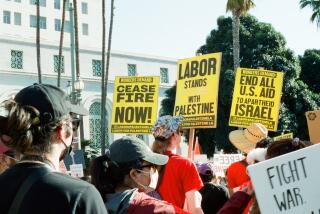Fast Ends With Accord on Blowers
A group of gardeners on a hunger strike to protest Los Angeles’ ban on gasoline-powered leaf blowers ended their seven-day fast on the City Hall lawn Friday after extracting written promises that city officials would help them find legal substitutes for the machines.
The strike ended late in the afternoon after three City Council members visited the protesters in the makeshift tent city and delivered written pledges to hold hearings on finding alternatives to the gas-powered blowers. Mayor Richard Riordan had sent the strikers a similar promise earlier in the day.
“The strike is over!” yelled Alvaro Huerta, a member of the gardener’s group fighting the ban. A deafening cheer rose from the crowd of about 500 gardeners and their families waiting in the pouring rain to hear the decision.
“This victory is all yours,” he added. “You birthed it, you fought for it. This is a victory for the gardeners of Los Angeles!”
Weak and unable to walk, the seven remaining hunger strikers were helped to the top of the steps to address the crowd.
“Nothing has been done in vain,” said Adrian Alvarez, one of the strike leaders. “Our influence has grown. We gained what we wanted: that they take us seriously and begin a dialogue to find a better solution.”
Rain lashed the encampment most of the day Friday as the hunger strikers insisted on holding out until they were given written promises that the city would find what the protesters agreed were realistic alternatives to the leaf blowers, which were banned by an ordinance that Riordan signed Thursday.
The mayor’s office delivered the mayor’s written pledge by noon. “I am committed to finding ways to help the city gardeners comply with existing laws and to work with manufacturers and others to improve upon existing technology,” Riordan wrote.
That letter satisfied the strikers, but they wanted similar pledges from Councilwoman Cindy Miscikowski, sponsor of the leaf blower ban, and Councilman Mike Hernandez, a leading opponent of the idea.
In the end, they received letters from both council members, as well as Councilwoman Jackie Goldberg, promising that hearings will be held within two weeks.
The hearings will study new technology available to power leaf blowers, as well as ways to find loans for gardeners to purchase whatever new equipment the council approves. The hearings also will include discussions with the Department of Water and Power, which has funds for researching alternative fuels.
“I believe a spirit of cooperation can prevail and that solutions . . . can be found to enable gardeners to continue earning a living while bringing cleaner air and peace and quiet to our city’s neighborhoods,” Miscikowski wrote.
Hundreds of gardeners spent the day in the rain waiting for the council members to deliver their promises. The large crowd marched around City Hall and rallied in support of their fasting colleagues.
Under umbrellas and carrying signs that read “We Have a Right to Make a Living,” gardeners formed a sea of green caps at the foot of the building.
“Si, se puede!” (“Yes, we can!”) shouted the crowd, cheering on the hunger strikers, who sat in wheelchairs surrounded by their families at the top of the steps.
Wrapped in blankets, the seven strikers who remained in the end said they felt weak and sick. Earlier in the week, four of their colleagues dropped out of the protest after doctors said they were dangerously ill.
“It’s so hard with the rain and the cold,” said striker Roberto Cabrera. “I don’t think this is good for my health.” His wife, Maria, stood nearby, clutching their 6-month-old son and wiping away tears.
“I feel happy now,” Alvarez said. “Now I can get back to civilization.” The men would consult with doctors before they began eating again, he said.
City officials welcomed the end of the episode, which has attracted wide attention among Latin Americans and in Mexico. The mayor’s news conference on the topic Thursday was one of the best-attended of his second term, and many of the reporters present were from Mexican news organizations.
Riordan, who visited the hunger strikers Wednesday, said Friday that he was glad they had faith in him and the council as they try to reach a better solution to the problems of irritated homeowners and mostly low-income gardeners. He also reiterated his offer of a free meal for the strikers at his downtown restaurant, the Original Pantry.
But even as the hunger strike wound to an end, the protest left its mark on City Hall, reminding council members and others that the city’s increasingly politically active Latino community is gathering strength and demonstrating the extreme volatility of the class-based politics that the leaf blower ban came to embody.
“There’s no question that this movement is growing and only getting bigger,” Hernandez said. “And there are going to be problems if the government isn’t willing to listen.”
Some observers noted that one of the strikers was also involved in a hunger strike at UCLA called to protest the end of financial aid for undocumented students; that led critics to suggest that the City Hall protest was staged by activists and did not reflect the true views of gardeners, many of whom are among the city’s large population of working poor.
Others, however, accused supporters of the leaf-blower ban of moving callously and carelessly to adopt an ordinance that punishes the working poor in order to remedy a minor inconvenience for affluent homeowners. Even some supporters of the ban acknowledged that they underestimated the reaction by gardeners faced with the potential loss of their livelihood.
On Thursday, Miscikowski, who has long supported the ban, said she believed more work was needed to develop a proposal that balanced health and environmental interests against humanitarian and economic ones.
“I feel good about the end of this,” Miscikowski said Friday after delivering her letter to the strikers. “I think the point was made about the realization of economic empowerment. We’re committed to getting a dialogue going about that.”
More to Read
Sign up for Essential California
The most important California stories and recommendations in your inbox every morning.
You may occasionally receive promotional content from the Los Angeles Times.











